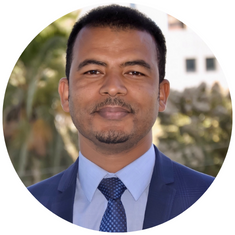
Tegbaru Gobezie
Role: Conference Bursary Recipient
Department: School of Environmental Sciences
Conference Attended: 22nd World Congress of Soil Science (WCSS) – Glasgow 2022
Location: Glasgow, UK
Value: $3,605.00
Research Presentation:
The general objective of my study is to develop improved soil data curation approaches and digital soil map methods for the Ontario Soil Information System (OSIS). This included a step-wise end-to-end approach: (1) develop algorithm/s for curating different soil data types and sources (2) evaluating different digital soil mapping methods including ensemble machine learning, and (3) investigate one soil property (soil organic carbon content/stock) to generate digital soil map outputs from two distinct soil data sources to make decision at landscape level. Specifically, the first objective of my research, which creates automated data quality control and curation coupled with data mining algorithms is one of the thematic areas of FFT. Therefore, this work directly contributes to the realization of digital agriculture research and its applications, which is an integral part of FFT. In addition to supporting informed decision making at landscape level, the best validated approaches, algorithms, and methods in this study can potentially be scaled up at national and global level since this question crosses boundaries. So that, it adds to the FFT goal to position Canada as a global leader in creating data-driven innovative solutions to transmogrify Agri-food systems.
Objectives for Attending:
The benefit of participating on this upcoming conference will be threefold. The first is to share one of the outputs of my PhD research (outlined in the abstract) and the progress I made so far to seek suggestions, comments, and ideas from the fellow conference participants. The fact that participants of the international union of soil society and conference participants come from diverse backgrounds will help me get different perspectives to advance the impacts of my study. The second benefit would be networking with fellow graduate students, professors, and conference participants for future opportunities and project partnership. Most importantly to meet and discuss with globally acclaimed scientists (either in formal and informal settings) in the area of global soil data harmonization, digital soil mapping and digital agriculture. Eventually, this adds to achieve my short-term and long-term learning and career goals. The last but not the least, I am a great enthusiast of research and policy linkage (i.e., the role of research in policy making) and I see the industry exhibition that will take place throughout the congress dates as an opportunity to shop technologies. In turn, new insights in to connect scientific rigour and entrepreneurial agility. Moreover, the soil tour, which I am planning to register after the full-congress programme is published, will give me an opportunity to visit selected and distinct soil types and tailored management options in the agricultural landscape outside the city of Glasgow. This would help me get practical and firsthand information to understand the variability of soils at representative locations in Scotland. This is very aligned with my PhD research questions and the quest to realize improved predictive digital soil mapping methods to support tailored decision-making in Ontario and all of Canada.

